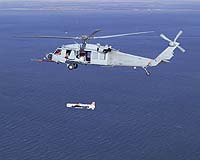| . |  |
. |
Archbald PA (SPX) Nov 02, 2009 Lockheed Martin has successfully completed the first in a series of flight tests of the paveway II Plus Laser Guided Bomb (LGB) guidance kit. The paveway II Plus LGB uses an enhanced laser guidance package, significantly improving precision when compared to existing paveway II LGBs. The flight test consisted of two GBU-10s released from a U.S. Navy Super Hornet at the Navy's China Lake, CA, test ranges. Each weapon included the new paveway II Plus MAU-209C/B Computer Control Group. Both weapons, which were also equipped with telemetry instrumentation, were released using a set of pre-determined flight conditions, initiated laser guidance as planned and successfully guided to direct hits on the target. "The paveway II Plus is a revolutionary performance improvement to the paveway II LGB weapon system," said Joe Serra, senior manager for Precision Guided Systems at Lockheed Martin Missiles and Fire Control. "Our team fully embraced the challenge to cost effectively improve the precision of this mature weapon system without impacting logistics. The paveway II Plus provides significantly better impact accuracy without any changes to the aircraft platform or weapon employment." Lockheed Martin is a qualified provider of the paveway II LGB, of all three variants of the paveway II MK-80 series LGBs, and is the sole provider of the paveway II Enhanced Laser Guided Training Round and Dual Mode Laser Guided Bomb. Paveway II LGB guidance kits improve weapon accuracy and reduce risk to U.S. and allied ground forces by converting gravity weapons into precision-guided munitions. Each kit consists of a computer control group, which is the front-end guidance system, plus an air foil group which adds stability fins on the back of each weapon. Lockheed Martin's LGB kits can be carried on U.S. Air Force, U.S. Navy and most international aircraft platforms currently authorized to carry and release LGBs. Kits are fully compatible and interoperable with existing paveway II LGB logistics infrastructure, equipment, procedures and aircrew operations. Lockheed Martin has delivered more than 55,000 LGB kits to the U.S. Air Force, U.S. Navy and international customers. Laser-guided bombs have been used successfully in Operation Iraqi Freedom and current overseas contingency operations. Share This Article With Planet Earth
Related Links Lockheed Martin The latest in Military Technology for the 21st century at SpaceWar.com
 Raytheon Awarded Contract For Airborne Low Frequency Sonar
Raytheon Awarded Contract For Airborne Low Frequency SonarTewksbury MA (SPX) Nov 02, 2009 Raytheon has received an $81.1 million U.S. Navy contract for the AN/AQS-22 Airborne Low Frequency Sonar (ALFS), the primary undersea warfare sensor for the Navy's MH-60R multi-mission helicopter. "ALFS advances the capabilities of the Navy's anti-submarine warfare mission, giving the fleet an unfair advantage over enemy submarines," said Raytheon Integrated Defense Systems' (IDS) Charles ... read more |
|
| The content herein, unless otherwise known to be public domain, are Copyright 1995-2009 - SpaceDaily. AFP and UPI Wire Stories are copyright Agence France-Presse and United Press International. ESA Portal Reports are copyright European Space Agency. All NASA sourced material is public domain. Additional copyrights may apply in whole or part to other bona fide parties. Advertising does not imply endorsement,agreement or approval of any opinions, statements or information provided by SpaceDaily on any Web page published or hosted by SpaceDaily. Privacy Statement |